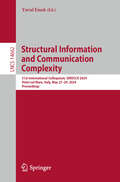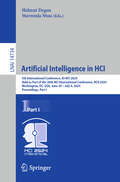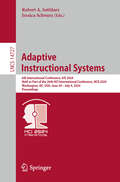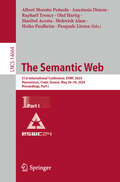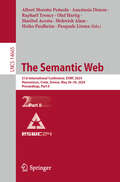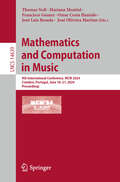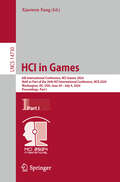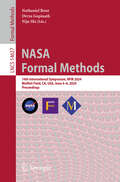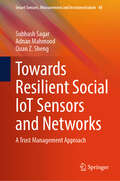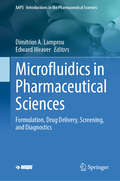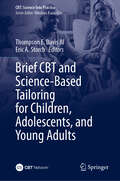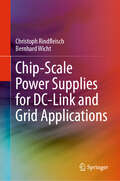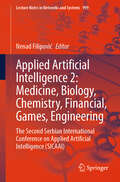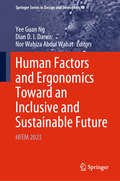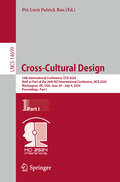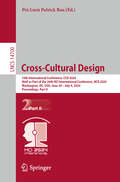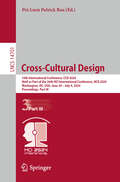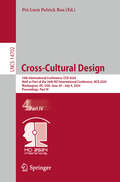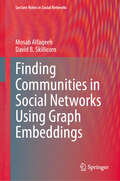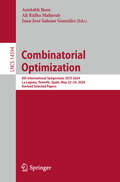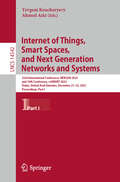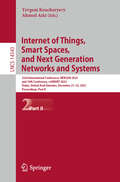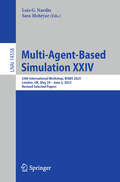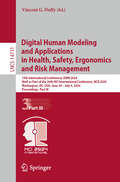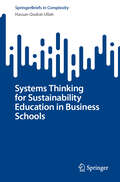- Table View
- List View
Structural Information and Communication Complexity: 31st International Colloquium, SIROCCO 2024, Vietri sul Mare, Italy, May 27–29, 2024, Proceedings (Lecture Notes in Computer Science #14662)
by Yuval EmekThis book constitutes the refereed proceedings of the 31th International Colloquium on Structural Information and Communication Complexity, SIROCCO 2024, held in Haifa, Israel in May 2024. The 24 full papers and 6 short papers presented in this book were carefully reviewed and selected from 49 submissions. SIROCCO is devoted to the study of the interplay between structural knowledge, communication, and computing in decentralized systems of multiple communicating entities. Special emphasis is given to innovative approaches leading to better understanding of the relationship between computing and communication.
Artificial Intelligence in HCI: 5th International Conference, AI-HCI 2024, Held as Part of the 26th HCI International Conference, HCII 2024, Washington, DC, USA, June 29 – July 4, 2024, Proceedings, Part I (Lecture Notes in Computer Science #14734)
by Helmut Degen Stavroula NtoaThe three-volume book set LNAI 14734, 14735, and 14736 constitutes the refereed proceedings of 5th International Conference on Artificial Intelligence in HCI, AI-HCI 2024, held as part of the 26th International Conference, HCI International 2024, which took place in Washington, DC, USA, during June 29-July 4, 2024. The total of 1271 papers and 309 posters included in the HCII 2024 proceedings was carefully reviewed and selected from 5108 submissions. The AI-HCI 2024 proceedings were organized in the following topical sections: Part I: Human-centered artificial intelligence; explainability and transparency; AI systems and frameworks in HCI; Part II: Ethical considerations and trust in AI; enhancing user experience through AI-driven technologies; AI in industry and operations; Part III: Large language models for enhanced interaction; advancing human-robot interaction through AI; AI applications for social impact and human wellbeing.
Adaptive Instructional Systems: 6th International Conference, AIS 2024, Held as Part of the 26th HCI International Conference, HCII 2024, Washington, DC, USA, June 29–July 4, 2024, Proceedings (Lecture Notes in Computer Science #14727)
by Jessica Schwarz Robert A. SottilareThis book constitutes the refereed proceedings of 6th International Conference on Adaptive Instructional Systems, AIS 2024, held as part of the 26th International Conference, HCI International 2024, which took place in Washington, DC, USA, during June 29-July 4, 2024. The total of 1271 papers and 309 posters included in the HCII 2024 proceedings was carefully reviewed and selected from 5108 submissions. The HCII-AIS 2024 contributions have been organized in the following topical sections: Designing and developing adaptive instructional systems; adaptive learning experiences; AI in adaptive learning.
The Semantic Web: 21st International Conference, ESWC 2024, Hersonissos, Crete, Greece, May 26–30, 2024, Proceedings, Part I (Lecture Notes in Computer Science #14664)
by Heiko Paulheim Raphaël Troncy Olaf Hartig Mehwish Alam Maribel Acosta Anastasia Dimou Pasquale Lisena Albert Meroño PeñuelaThe two-volume set LNCS 14664 and 14665 constitutes the refereed proceedings of the 21st International Conference on The Semantic Web, ESWC 2024, held in Hersonissos, Crete, Greece, during May 26-30, 2024. The 32 full papers presented were carefully reviewed and selected from 138 submissions. They focus on all aspects of theoretical, analytical, and empirical aspects of the semantic web, semantic technologies, knowledge graphs and semantics on the web in general.
The Semantic Web: 21st International Conference, ESWC 2024, Hersonissos, Crete, Greece, May 26–30, 2024, Proceedings, Part II (Lecture Notes in Computer Science #14665)
by Heiko Paulheim Raphaël Troncy Olaf Hartig Mehwish Alam Maribel Acosta Anastasia Dimou Pasquale Lisena Albert Meroño PeñuelaThe two-volume set LNCS 14664 and 14665 constitutes the refereed proceedings of the 21st International Conference on The Semantic Web, ESWC 2024, held in Hersonissos, Crete, Greece, during May 26-30, 2024. The 32 full papers presented were carefully reviewed and selected from 138 submissions. They focus on all aspects of theoretical, analytical, and empirical aspects of the semantic web, semantic technologies, knowledge graphs and semantics on the web in general.
Mathematics and Computation in Music: 9th International Conference, MCM 2024, Coimbra, Portugal, June 18–21, 2024, Proceedings (Lecture Notes in Computer Science #14639)
by Thomas Noll Mariana Montiel Francisco Gómez Omar Costa Hamido José Luis Besada José Oliveira MartinsThis book constitutes the refereed proceedings of the 9th International Conference on Mathematics and Computation in Music, MCM 2024, held in Coimbra, Portugal, during June 18–21, 2024. The 30 full papers and 9 short papers included in this book were carefully reviewed and selected from 45 submissions. They were organized in topical sections as follows: mathematical scale theory and tuning; rhythm analysis and rhythm generation; categorical and algebraic approaches to music; quantum music; theory and algorithms for melodic- harmonic analysis and generation; geometric approaches to musical algorithms and microtonality; fourier analysis for music; similarity and distance measures for music; short papers; communication-performances; and tribute to Yves Hellegouarch.
HCI in Games: 6th International Conference, HCI-Games 2024, Held as Part of the 26th HCI International Conference, HCII 2024, Washington, DC, USA, June 29–July 4, 2024, Proceedings, Part I (Lecture Notes in Computer Science #14730)
by Xiaowen FangThis book constitutes the refereed proceedings of the 6th International Conference on HCI in Games, held as part of the 26th International Conference, HCI International 2024, which took place in Washington DC, USA, during June 29 - July 4, 2024. The total of 1271 papers and 309 posters included in the HCII 2024 proceedings was carefully reviewed and selected from 5108 submissions. The two volume set of HCI-Games 2024 proceedings were organized in the following topical sections: Volume 14730: Part I: Game Design and Gamification; Part II: Game-based Learning; Part III: Games and Artificial Intelligence Volume 14731: Part I: Advancing Education Through Serious Games; Part II: Player Experience and Engagement
NASA Formal Methods: 16th International Symposium, NFM 2024, Moffett Field, CA, USA, June 4–6, 2024, Proceedings (Lecture Notes in Computer Science #14627)
by Nathaniel Benz Divya Gopinath Nija ShiThis LNCS 14627 conference volume constitutes the proceedings of the 16th International Symposium on NASA Formal Methods, NFM 2024, held in Moffett Field, CA, USA in June 2024. The 20 full papers together with 6 short papers included in this volume were carefully reviewed and selected from 68 submissions. The conference focuses on the on formal techniques for software and system assurance for applications in space, aviation, robotics, and other NASA-relevant safety-critical systems.
Towards Resilient Social IoT Sensors and Networks: A Trust Management Approach (Smart Sensors, Measurement and Instrumentation #48)
by Quan Z. Sheng Adnan Mahmood Subhash SagarThis book, at first, explores the evolution of the IoT to SIoT and offers a comprehensive understanding of SIoT and trust management vis-à-vis SIoT. It subsequently envisages trust quantification models by employing key SIoT-specific trust features, including SIoT relationships (e.g., friendships, working relationships, and community-of-interest), direct observations, and indirect observations, to augment the idea of trust quantification of a SIoT object. Furthermore, diverse trust aggregation techniques, i.e., conventional weighted sum, machine learning, and artificial neural networks, are proposed so as to address the challenges of the trust aggregation. Finally, the book outlines the future research directions for emphasizing the importance of trustworthiness management in the evolving notion of the SIoT.
Microfluidics in Pharmaceutical Sciences: Formulation, Drug Delivery, Screening, and Diagnostics (AAPS Introductions in the Pharmaceutical Sciences #14)
by Dimitrios A. Lamprou Edward WeaverThe book covers the basics of microfluidics, current applications in areas such as formulation, drug delivery, drug screening and development, monitoring and diagnostics, and case studies from a teaching perspective to undergraduate and postgraduate students, allowing application of the content in a flipped classroom. Multiple choice questions are included at the end of each chapter. All chapter authors are pioneers and world leaders. This is an ideal book for students, researchers, and industry professionals working on microfluidics in the pharmaceutical sciences.
Brief CBT and Science-Based Tailoring for Children, Adolescents, and Young Adults (CBT: Science Into Practice)
by Eric A. Storch Thompson E. DavisThis book highlights the ongoing trend of brief treatments in psychotherapy for child and adolescent populations. Whereas their therapeutic predecessors may have taken 15 to 20 one-hour sessions or more, these newer therapies may begin to alleviate symptoms in only weeks, days, or even hours on the same day. Interest in child and adolescent brief and intensive therapies is currently at an all-time high on the heels of research showing impressive results for these interventions. Treatments such as One-Session Treatment for specific phobias which occurs in only one, three-hour session or Intensive Cognitive-Behavioral Therapy with Exposure and Response Prevention for obsessive-compulsive disorder which occurs 3-5 times weekly in 1-3-hour sessions over several weeks, are prominent examples. This volume builds on this growing interest and the emerging child and adolescent research, summarizing the efficacy of these interventions. Further, this volume will include key introductory chapters on the emergence of brief and intensive therapies, the ethics of their use, their cost-effectiveness, and the current state of the science. Brief therapies for specific disorders and via specific methodologies comprise separate chapters. Each chapter incorporates an exemplar case study (including a case overview, formulation/conceptualization, treatment description, follow-up, and recommendations for refractory cases). Also included are multicultural insights and ethical considerations. Furthermore guidance is provided on how to use the current and ongoing evidence base to inform formulation and treatment. This volume is timely and thorough in its presentation of the relevant literature and provides a much-needed resource for students, practitioners, and researchers alike. In a moment where youth mental health problems are on the rise, this is the book we need! Tara Peris, Ph.D. UCLA Like Superman squeezing coal into diamonds, Davis and Storch have compiled the definitive guide to brief, concentrated psychotherapy. Eli Lebowitz, Ph.D. Yale Child Study Center Davis and Storch score big in this edited volume on Brief, Intensive, and Concentrated treatments for a host of childhood problems. Thomas Ollendick, Ph.D. Virginia Tech
Chip-Scale Power Supplies for DC-Link and Grid Applications
by Bernhard Wicht Christoph RindfleischThis book is a comprehensive single-source on the design of chip-scale high-voltage power supplies for low-power DC-link and grid applications. It is written in handbook style with systematic guidelines and includes implementation examples. The authors cover the full range, from technology fundamentals to circuit implementation details. The book includes guidelines for the application-specific selection of the converter topology, design guidelines for the inductive components, and a detailed description of low-power optimized control approaches and subcircuits. The authors also include guidelines for the selection and design of high-voltage on-chip power switches and for the reduction of parasitic effects such as capacitive losses.
Applied Artificial Intelligence 2: The Second Serbian International Conference on Applied Artificial Intelligence (SICAAI) (Lecture Notes in Networks and Systems #999)
by Nenad FilipovićThe book Applied Artificial Intelligence 2: Medicine, Biology, Chemistry, Financial, Games, Engineering is providing exceptional chapters of the state-of-the-art research knowledge and results on the innovative theories, methodology and applications of artificial intelligence and its sub-domain like deep learning, machine learning in different areas such as medicine, economy, education, law, smart city, government, industry etc. Innovative research ideas on how to solve problems using artificial intelligence, both in R&D and real-time applications are presented. Chapters describe the advanced prototypes, systems, methodologies, tools and techniques and general survey papers, which indicate future directions. These Chapters are extended papers from the Second Serbian International Conference on Applied Artificial Intelligence (SICAAI), which was held in Kragujevac, Serbia, on May 19-20, 2023
Human Factors and Ergonomics Toward an Inclusive and Sustainable Future: HFEM 2023 (Springer Series in Design and Innovation #46)
by Yee Guan Ng Dian D. I. Daruis Nor Wahiza Abdul WahatThis book gathers the refereed proceedings of the 5th HFEM Biennial Conference on Human Factors and Ergonomics, organized by the Human Factors and Ergonomics Society Malaysia, held in Langkawi, Malaysia on August 13–18, 2023. Under the theme "Accelerating Human Factors and Ergonomics Toward an Inclusive and Sustainable Future", it highlights the latest theories and models, as well as cutting-edge technologies and applications on human factors and ergonomics. By combining findings from a range of disciplines including engineering, design, robotics, health care, management, computer science, human biology, and behavioral science, it offers an excellent source of innovative ideas to stimulate future discussions and developments aimed at applying knowledge and techniques to optimize system performance, while at the same time promoting the health, safety, and well-being of individuals. It includes papers from researchers and practitioners, scientists and physicians, institutional leaders, managers, and policy makers that contribute to constructing the human factors and ergonomics approach across a variety of methodologies, domains, and productive sectors.
Cross-Cultural Design: 16th International Conference, CCD 2024, Held as Part of the 26th HCI International Conference, HCII 2024, Washington, DC, USA, June 29 – July 4, 2024, Proceedings, Part I (Lecture Notes in Computer Science #14699)
by Pei-Luen Patrick RauThis four-volume set LNCS 14699-14702 constitutes the thoroughly refereed proceedings of the 16th International Conference on Cross-Cultural Design 2024 (CCD 2024), held as part of the 26th International Conference on Human-Computer Interaction, HCI International 2024 (HCII 2024), was held as a hybrid event in Washington DC, USA, during June/July 2024. The total of 1271 papers and 309 posters included in the HCII 2023 proceedings was carefully reviewed and selected from 5108 submissions. The CCD 2024 conference focuses a broad range of theoretical and applied issues related to Cross-Cultural Design and its applications, and much more.
Cross-Cultural Design: 16th International Conference, CCD 2024, Held as Part of the 26th HCI International Conference, HCII 2024, Washington, DC, USA, June 29 – July 4, 2024, Proceedings, Part II (Lecture Notes in Computer Science #14700)
by Pei-Luen Patrick RauThis four-volume set LNCS 14699-14702 constitutes the thoroughly refereed proceedings of the 16th International Conference on Cross-Cultural Design 2024 (CCD 2024), held as part of the 26th International Conference on Human-Computer Interaction, HCI International 2024 (HCII 2024), was held as a hybrid event in Washington DC, USA, during June/July 2024. The total of 1271 papers and 309 posters included in the HCII 2023 proceedings was carefully reviewed and selected from 5108 submissions. The CCD 2024 conference focuses a broad range of theoretical and applied issues related to Cross-Cultural Design and its applications, and much more.
Cross-Cultural Design: 16th International Conference, CCD 2024, Held as Part of the 26th HCI International Conference, HCII 2024, Washington, DC, USA, June 29 – July 4, 2024, Proceedings, Part III (Lecture Notes in Computer Science #14701)
by Pei-Luen Patrick RauThis four-volume set LNCS 14699-14702 constitutes the thoroughly refereed proceedings of the 16th International Conference on Cross-Cultural Design 2024 (CCD 2024), held as part of the 26th International Conference on Human-Computer Interaction, HCI International 2024 (HCII 2024), was held as a hybrid event in Washington DC, USA, during June/July 2024. The total of 1271 papers and 309 posters included in the HCII 2023 proceedings was carefully reviewed and selected from 5108 submissions. The CCD 2024 conference focuses a broad range of theoretical and applied issues related to Cross-Cultural Design and its applications, and much more.
Cross-Cultural Design: 16th International Conference, CCD 2024, Held as Part of the 26th HCI International Conference, HCII 2024, Washington, DC, USA, June 29 – July 4, 2024, Proceedings, Part IV (Lecture Notes in Computer Science #14702)
by Pei-Luen Patrick RauThis four-volume set LNCS 14699-14702 constitutes the thoroughly refereed proceedings of the 16th International Conference on Cross-Cultural Design 2024 (CCD 2024), held as part of the 26th International Conference on Human-Computer Interaction, HCI International 2024 (HCII 2024), was held as a hybrid event in Washington DC, USA, during June/July 2024. The total of 1271 papers and 309 posters included in the HCII 2023 proceedings was carefully reviewed and selected from 5108 submissions. The CCD 2024 conference focuses a broad range of theoretical and applied issues related to Cross-Cultural Design and its applications, and much more.
Finding Communities in Social Networks Using Graph Embeddings (Lecture Notes in Social Networks)
by David B. Skillicorn Mosab AlfaqeehCommunity detection in social networks is an important but challenging problem. This book develops a new technique for finding communities that uses both structural similarity and attribute similarity simultaneously, weighting them in a principled way. The results outperform existing techniques across a wide range of measures, and so advance the state of the art in community detection. Many existing community detection techniques base similarity on either the structural connections among social-network users, or on the overlap among the attributes of each user. Either way loses useful information. There have been some attempts to use both structure and attribute similarity but success has been limited. We first build a large real-world dataset by crawling Instagram, producing a large set of user profiles. We then compute the similarity between pairs of users based on four qualitatively different profile properties: similarity of language used in posts, similarity of hashtags used (which requires extraction of content from them), similarity of images displayed (which requires extraction of what each image is 'about'), and the explicit connections when one user follows another. These single modality similarities are converted into graphs. These graphs have a common node set (the users) but different sets a weighted edges. These graphs are then connected into a single larger graph by connecting the multiple nodes representing the same user by a clique, with edge weights derived from a lazy random walk view of the single graphs. This larger graph can then be embedded in a geometry using spectral techniques. In the embedding, distance corresponds to dissimilarity so geometric clustering techniques can be used to find communities. The resulting communities are evaluated using the entire range of current techniques, outperforming all of them. Topic modelling is also applied to clusters to show that they genuinely represent users with similar interests. This can form the basis for applications such as online marketing, or key influence selection.
Combinatorial Optimization: 8th International Symposium, ISCO 2024, La Laguna, Tenerife, Spain, May 22–24, 2024, Revised Selected Papers (Lecture Notes in Computer Science #14594)
by Amitabh Basu Ali Ridha Mahjoub Juan José Salazar GonzálezThis book constitutes the refereed proceedings of the 8th International Symposium on Combinatorial Optimization, ISCO 2024, held in La Laguna, Tenerife, Spain, during May 22–24, 2024. The 30 full papers included in this book were carefully reviewed and selected from 46 submissions. They were organized in topical sections as follows: integer programming; graph theory; parameterized algorithms; approximation algorithms; integer programming for machine learning; and applications.
Internet of Things, Smart Spaces, and Next Generation Networks and Systems: 23rd International Conference, NEW2AN 2023, and 16th Conference, ruSMART 2023, Dubai, United Arab Emirates, December 21–22, 2023, Proceedings, Part I (Lecture Notes in Computer Science #14542)
by Yevgeni Koucheryavy Ahmed AzizThis book constitutes the refereed proceedings of the 23rd International Conference on Next Generation Wired/Wireless Networking, NEW2AN 2023, and the 16th Conference on Internet of Things and Smart Spaces, ruSMART 2023, held in Dubai, United Arab Emirates, in December 21–22, 2023. The 67 full papers included in the joint proceedings were carefully reviewed and selected from 258 submissions. They present a unique cross-disciplinary mixture of telecommunications-related research and science, various aspects of next generation data networks, while special attention is given to advanced wireless networking and applications.
Internet of Things, Smart Spaces, and Next Generation Networks and Systems: 23rd International Conference, NEW2AN 2023, and 16th Conference, ruSMART 2023, Dubai, United Arab Emirates, December 21–22, 2023, Proceedings, Part II (Lecture Notes in Computer Science #14543)
by Yevgeni Koucheryavy Ahmed AzizThis book constitutes the refereed proceedings of the 23rd International Conference on Next Generation Wired/Wireless Networking, NEW2AN 2023, and the 16th Conference on Internet of Things and Smart Spaces, ruSMART 2023, held in Dubai, United Arab Emirates, in December 21–22, 2023. The 67 full papers were carefully reviewed and selected from 258 submissions. The NEW2AN 2023 is well-established conference with a unique cross-disciplinary mixture of telecommunications-related research and science, various aspects of next generation data networks, while special attention is given to advanced wireless networking and applications.
Multi-Agent-Based Simulation XXIV: 24th International Workshop, MABS 2023, London, UK, May 29 – June 2, 2023, Revised Selected Papers (Lecture Notes in Computer Science #14558)
by Luis G. Nardin Sara MehryarThis book constitutes the refereed Proceedings of the 24th International Workshop on Multi-Agent-Based Simulation XXIV, MABS 2023, held in London, UK, during May 29–June 2, 2023. The 11 regular papers presented were carefully reviewed and selected from 27 submissions. The papers are organized in subject areas as follows: MABS methodology and tools; MABS and social behavior; and MABS applications.
Digital Human Modeling and Applications in Health, Safety, Ergonomics and Risk Management: 15th International Conference, DHM 2024, Held as Part of the 26th HCI International Conference, HCII 2024, Washington, DC, USA, June 29–July 4, 2024, Proceedings, Part III (Lecture Notes in Computer Science #14711)
by Vincent G. DuffyThis three-volume set LNCS 14709-14711 constitutes the refereed proceedings of the 15th International Conference on Digital Human Modeling and Applications in Health, Safety, Ergonomics and Risk Management, DHM 2024, held as part of the 26th International Conference, HCI International 2024, in Washington, DC, USA, during June 29 – July 4, 2024. The total of 1271 papers and 309 posters included in the HCII 2024 proceedings was carefully reviewed and selected from 5108 submissions. DHM 2024 method focuses on: Part I: Digital Human Modeling for Design and Evaluation; User Experience and Assistive Technologies; User Experience, Communication, and Collaboration. Part II: Healthcare Design and Support; Technology in Mental Health and Wellbeing; Artificial Intelligence and Health Applications. Part III: Work, Safety, and Ergonomics; Ergonomics, Artificial Intelligence and Smart Technologies, Advanced Technologies for Training and Learning.
Systems Thinking for Sustainability Education in Business Schools (SpringerBriefs in Complexity)
by Hassan Qudrat-UllahThis book delves into the current state and future prospects of systems thinking and sustainability education within business schools. It meticulously examines the trends and drivers shaping the demand and supply of such education, along with the implications and challenges it presents for various stakeholders and society at large. Strategic recommendations and suggestions are provided to elevate and propel systems thinking and sustainability education in business schools, outlining a visionary roadmap for the future. Furthermore, the book explores the intersectionality of sustainability and diversity in business education, offering examples and cases of visionary and innovative initiatives and projects in the field. Distinguished by special features such as illustrations, the book offers a comprehensive and integrative overview of the current landscape and future trajectories of systems thinking and sustainability education in business schools. The primary benefit for readers lies in gaining a deeper and broader understanding of systems thinking and sustainability education in business schools. It equips them with the knowledge to apply systems thinking and sustainability principles and tools to tackle the complex and wicked problems of the twenty-first century. Additionally, the book aims to inspire and inform business schools and their stakeholders to embrace and enhance systems thinking and sustainability education in their curricula and pedagogy, contributing to the advancement of sustainability and systems thinking in both business and society.
